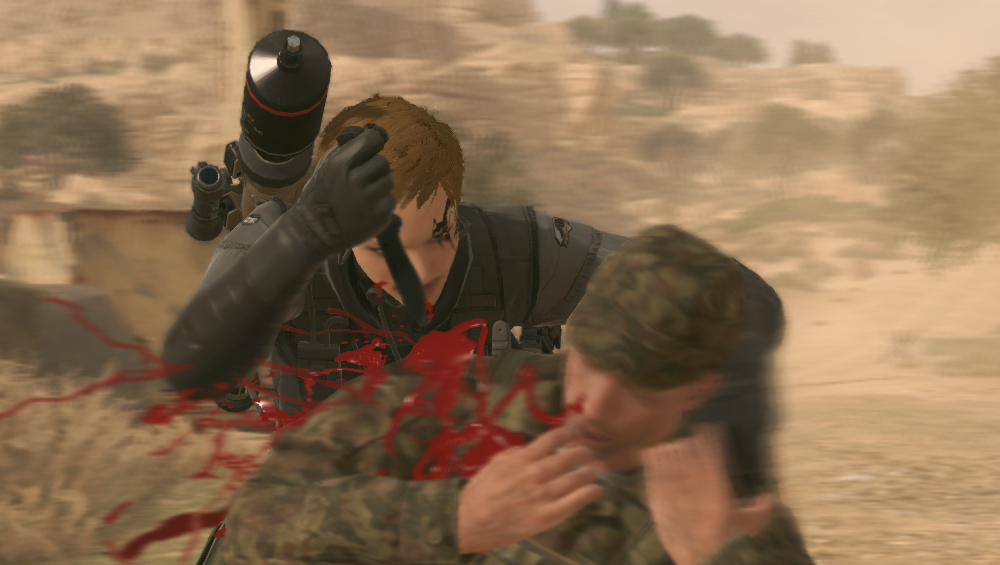The killing decision in Metal Gear Solid 5

Tom Francis is a former writer for PC Gamer and current game developer. He's been playing Metal Gear Solid 5: The Phantom Pain and writing up his thoughts on his personal website. We've been enjoying his musings and he agreed to let us share them with you here. You can follow the development of Tom's next game, Heat Signature, at its official site.
Almost every game that lets you take people out lethally or non-lethally presents it as a choice between pragmatism and ethics: killing is easier, but tranqing is nicer. That’s true in MGS V too, but it adds something else to that choice that solves a problem I’ve had with these games for ages.
The ability to play a game nonlethally lets you adopt that policy as your character’s moral code, and that makes your game persona a little more sympathetic. By the same token, it also demonises the act of killing: it’s no longer possible to claim it’s necessary, because you often have the developer’s word that it isn’t. To kill is now either the act of a sadistic monster, or an unsatisfying compromise made because you either couldn’t or couldn’t be bothered to pull off the non-lethal option.
So the ways of playing these games—including my own—boil down to:
1. Do everything nonlethally forever, no matter how difficult or boring it becomes.
2. Kill everyone, playing the role of a psychotic monster who usually clashes with both the story and your own ability to embody your character.
3. Stop caring about the distinction and do a messy mix of both, as your mood or the situation dictates.
The biggest gaming news, reviews and hardware deals
Keep up to date with the most important stories and the best deals, as picked by the PC Gamer team.

It’s probably clear from the way I’ve phrased these that I don’t find any of them entirely satisfactory. Very few games make the purely nonlethal option inherently fun – the faint satisfaction of knowing you’ve done the ‘right’ thing is balanced against how boring and time consuming the methods were, how many cool tools you weren’t allowed to use, and how utterly fake the whole charade is—you’re usually only doing it this way because you have divine knowledge that the world has been architected to make it possible.
Mechanically, I like the third option. I like having a lot of tools. Option 1 makes lethal tools forbidden, and option 2 makes nonlethal tools pointless. But by itself, option 3 doesn’t give you any particular reason to use both sets, so it can feel kind of empty.
That’s the thing MGS V fixes. With an early upgrade to your binoculars, you can scan every soldier to see how good they are at a variety of different tasks. If they’re any good, it’s worth taking them out non-lethally, because you can then tie a balloon to them, send them up into the sky, have your colleagues collect them with a passing plane, fly them to the Seychelles, drop them off at an offshore base, persuade them to change sides to your private mercenary corp, then put them in full-time, devotedly loyal employment in the division of your base that their talents best suit.
I’ll be honest, this was not my next guess for how games would ultimately fix this problem.

But it does work.
You have to disengage with the moral aspect completely, of course—you’re now operating in a pretty grotesque fantasy land where no-one has a will that can’t be bent to serve your own. You can shoot a person 7 times in the knees and then make them work in your box-delivery department forever, and they will salute you on sight and thank you if you punch them. You could read it as parody or an ugly dominance fantasy, but I suspect it’s just where a series of cool systems ideas led them, and they didn’t much mind that it was narratively mad. Luckily, neither do I.
It works because there’s now a strong practical reason to use nonlethal tactics for some guards, and lethal for others. This guard has an A in Engineering and this one has a B in Intel, so I’ll tranq those two and kill the rest. You don’t have to kill the rest, but as in most games it’s easier: you have more powerful, more varied, and more satisfying tools to do it, and it eliminates them from the complicated patrol equation: people don’t get up from death.
Pure lethal and pure nonlethal are still options, but by fleshing out option 3 with interesting systems, it makes it clear how much less interesting they really are. Fine for an experimental or role-playing playthrough, but monotonous compared to the juice you can get out of that choice if you let it vary situationally.
In other games, the “kill or tranq?” question asks you to pick one of two possible playthroughs at the start, and it takes a dozen hours to finish enunciating your answer. MGS V lets it become an ongoing debate.
This article was originally posted on pentadact.com.
Need more Metal Gear? Check out the rest of our coverage or read our review.

